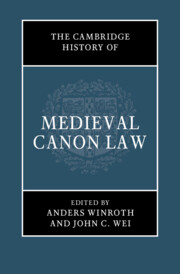ABOUT THE BOOK
Canon law touched nearly every aspect of medieval society, including many issues we now think of as purely secular. It regulated marriages, oaths, usury, sorcery, heresy, university life, penance, just war, court procedure, and Christian relations with religious minorities. Canon law also regulated the clergy and the Church, one of the most important institutions in the Middle Ages. This Cambridge History offers a comprehensive survey of canon law, both chronologically and thematically. Written by an international team of scholars, it explores, in non-technical language, how it operated in the daily life of people and in the great political events of the time. The volume demonstrates that medieval canon law holds a unique position in the legal history of Europe. Indeed, the influence of medieval canon law, which was at the forefront of introducing and defining concepts such as ‘equity,’ ‘rationality,’ ‘office,’ and ‘positive law,’ has been enormous, long-lasting, and remarkably diverse.
Anders Winroth, taught medieval history at Yale University from 1998–2020, and currently teaches at the University of Oslo. The author of The Making of Gratian’s ‘Decretum,’ (Cambridge University Press, 2000) which revolutionized our understanding of medieval canon law, he was a named a MacArthur Foundation Fellow in 2003. He serves as President of the Institute of Medieval Canon Law.
John C. Wei, holds a Ph.D. in medieval history from Yale University and a J.D. from Yale Law School. He is the author of Gratian the Theologian (2016) and the editor of the decretist Reverentia sacrorum canonum. He has authored many articles on medieval law and theology.
The table of contents can be find here.


No comments:
Post a Comment
Note: Only a member of this blog may post a comment.